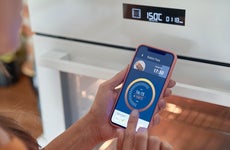When is the best time to buy appliances?

The Bankrate promise
At Bankrate we strive to help you make smarter financial decisions. While we adhere to strict , this post may contain references to products from our partners. Here's an explanation for .
Key takeaways
- The best time to shop for a home appliance depends on the type of appliance you’re looking for, as new models appear at different times of the year.
- In general, you can get the best deals around major holidays that reflect a change in seasons (Labor Day, Memorial Day) and special bargain days, like Black Friday.
- Additionally, you can often save money on appliances by purchasing a floor or a refurbished model, asking for price matches, buying out-of-season, and comparing prices online.
Major household appliances are a major investment these days, fetching four- and even five-figure prices. Of course you know to keep your eye out for clearance or store-closing sales. But you may not realize that there’s a predictable pattern to when the deals on dishwashers, refrigerators, washer/dryers, etc. occur.
Like automakers, appliance manufacturers periodically introduce new models. For most, the prime launch season is between September and December; so, many of last year’s toys go up for grabs at heavily discounted prices during those months. However, some appliances may be cheaper at other times of the year, especially if they are seasonal (think heaters or air conditioners).
Whether you are shopping online or at a store, the price of every appliance varies by type, model, and season. Here are some of the best times of year to purchase new appliances, and how good the deals tend to be.
What is the best time to buy appliances?
The best time to go shopping for an appliance depends to some extent on the type of appliance you need.
Autumnal peak
For larger appliances such as stoves, furnaces and washers/dryers, the absolute best time is in the autumn, some experts swear. “Late fall is a sweet spot,” says Jason Carter, an appliance technician and founder of SimplySwider.com, a resource for all things appliance maintenance and repairs. “That’s when the new appliance models hit the market, and retailers are keen on clearing out space for them.”
A typical discount is around 20 percent to 25 percent off the list price, but sometimes it can be as high as 50 percent or 70 percent.
Holidays
The peak-sales season may often be merged with holiday sales like those on Veterans Day. Watch for big bargains around other holidays too, like Mother’s Day or New Year’s Day.
Holidays that mark a change of season are often a prime time for promotions. Cases in point: Memorial Day (the start of summer), Labor Day (the onset of autumn), and Black Friday/Cyber Monday (kickoff to Christmas/Hanukkah/Kwanzaa time) and the weekends around them.
End of the year
Smaller appliances such as coffee makers, toasters and microwave ovens usually go on sale during the end of the year, when manufacturers are trying to make way for new models. There is rarely much of a difference between last year’s models and the brand-new ones; by purchasing a discontinued model, you can often get virtually the same appliance for nearly half the price.
Off-season
Buying seasonal items when they’re out of season is another strategy to save on household appliances. You could try shopping for an air conditioner when winter is around the corner and most other people are busy looking at heaters and furnaces. Similarly, heaters and boilers are cheaper in summer because that’s the season when folks are thinking grills and coolers. Just one caveat: A lot of items might be out-of-stock, so your choices might be limited during the off-season.
What is the best time of year to buy appliances?
Here are some of the best times of year to purchase specific appliances.
| Months | Best appliances to buy |
|---|---|
| Spring (May/June) |
Refrigerators Large electronics |
| Fall (September/October/November) | Washers Dryers Dishwashers Water heaters |
| Winter (December/January) |
Ranges Ovens Air conditioners |
Other ways to save on appliances
If you can’t wait until a sale to purchase a new appliance, there are plenty of other ways to potentially save money on appliances, at any time of the year:
Ask about discontinued/floor models
Buying a model that’s on display on the showroom floor could save you up to 15 percent off retail, and so can buying a model that has been discontinued. Stores may not advertise this option, so make sure to ask the salesperson or manager. It may look a little faded, worn or chipped, but as long as nothing is fundamentally wrong, who cares?
Even better: an “open-box” model — one that was purchased and then returned to the retailer. Often, these haven’t even been turned on or plugged in, but since they’re technically used goods, they might be discounted as much as 50 percent. Of course, do make sure they function properly and no pieces are missing.
Consider refreshed/refurbished devices
Appliances with minor or cosmetic imperfections, or ones that have been labeled as “certified refurbished” by the manufacturer (meaning they’ve been repaired or restored) are often on offer for significantly low prices. However, when looking at less-than-perfect appliances, make sure they do not have cracked or broken glass panels, come with a warranty, and are in working condition with all parts intact.
Try small, independent businesses
You are more likely to find better deals at local, independent businesses than big-name retailers. They may even go the extra mile to offer perks like free repairs or installation. “Scratch-and-dent stores can also be a goldmine year-round, and manufacturers often roll out rebates that can really sweeten the deal,” says Carter.
Compare and shop online
You can compare appliance prices online before you even head to a store. Sites like PriceGrabber and Google Shopping let you look up discounted prices on appliances. You can also find pre-owned appliances for a fraction of the original price on eBay and Craigslist (though often these won’t come with warranties).
Other online marketplaces have special price offers on new appliances for a limited time: think Amazon and its famed “Prime Days,” 48 fast-paced hours of deals.
If the retailer has both a brick-and-mortar and an online presence, be sure to compare their prices. Sometimes a deal will be exclusively digital, other times the physical store will match it (even if they’re not advertising it).
Inquire about price-matching/belated discounts
“Asking about price matching can be quite valuable,” says Carter. In today’s hyper-competitive retail atmosphere, many stores swear they won’t be undersold (another reason to comparison-shop). Just make sure you’re showing them the exact same make and model appliance.
And if you’ve missed a store’s sale, don’t fret: “Many retailers will honor sale prices even after you’ve made your purchase, usually within a specific time frame,” says Carter. So, if you pay full-price for an appliance and it goes on sale the following week, you might be able to take advantage of the discount anyway.
How long do appliances last?
Knowing the lifespan of appliances can help you determine when to start shopping for new ones. The key is to plan your purchase so that you can replace aging appliances before they die and leave you desperate.
| Appliance | Average Lifespan (years) |
|---|---|
| Refrigerator | 13 |
| Washer | 10 |
| Dryer | 13 |
| Air conditioner | 13 |
| Dishwasher | 9 |
| Electric range | 13 |
| Gas range | 15 |
| Electric oven | 13 |
| Gas oven | 15 |
| Electric furnace | 15 |
| Gas furnace | 18 |
| Electric boiler | 13 |
| Gas boiler | 21 |
| Microwave oven | 9 |
| Toaster | 5 |
| Coffee maker | 6 |
Best ways to finance appliance purchases
Replacing major appliances can be hard on the finances, especially if you’re buying several at once — say, for a kitchen remodel or to add a laundry room. The following options can make the expense slightly more bearable.
- Retailer payment plans: Some retailers have payment plans where you can pay 30 percent at the time of purchase, and the rest over the next few months. Often there’s no interest rate — for a time. If that’s the case, you should pay off the entire balance before the promotional period ends.
- Personal loans: A personal loan, aka a home improvement loan, is available from most banks and lending institutions, has a fixed interest rate, and a repayment period between 12 and 60 months. If you need to finance a major appliance purchase — such as a boiler, a furnace, or the entire HVAC system — and have good credit and stable income, a small personal loan could be a quick and easy solution.
- Home equity loan: If you’re replacing several appliances at once, a home equity loan could come to your financial rescue. Using your house as the collateral, you could borrow against its equity and then pay it off over years. Often called a second mortgage, it’s useful for financing for home renovation or remodeling projects that include new appliances.
- Home equity line of credit (HELOC): This is similar to a home equity loan, only instead of a lump sum, a HELOC gives you a revolving line of credit. A HELOC is particularly useful when you have to make several appliance purchases over a few months, but aren’t yet sure of the total cost.
When is the worst time to buy appliances?
The single worst time to buy a new appliance is whenever you’re desperate for a replacement. You’re most likely to buy whatever option you first come across, regardless of the cost, because you don’t have the time to shop around.
Buying a new model just after it has just been released is also a bad idea. “New models often come with a premium, especially in the first half of the year,” says Carter. “Prices generally start to decrease around July and continue to drop through the holiday season, culminating in Black Friday deals. So, if you’re interested in that shiny new appliance, waiting until the fall might be a smarter move.”
Seasonal appliances are also most expensive when they’re in season. So, for example, shopping for an air conditioner in mid-summer and a heater in winter is probably not the smartest move.
Next steps in buying appliances
Use each appliance’s current condition to develop a plan for replacing it. That way, you not only start exploring your options early — and before the best time of the year to buy that particular type — but can also begin saving for them, too.
Knowing the best time to buy appliances can help you maximize savings while refreshing your home. You’ll be able to score retailers’ seasonal sales and manufacturers’ discounts to get the best models. Planning ahead to replace your appliances will also give you time to save up the money or secure financing (home equity loans and HELOCs can take some time, similar to mortgages).
One thing’s for sure: The wrong time to buy an appliance is when it breaks down. Because — faced with mounds of spoiling food or dirty clothes — you’ll probably pay anything.
Related Articles



